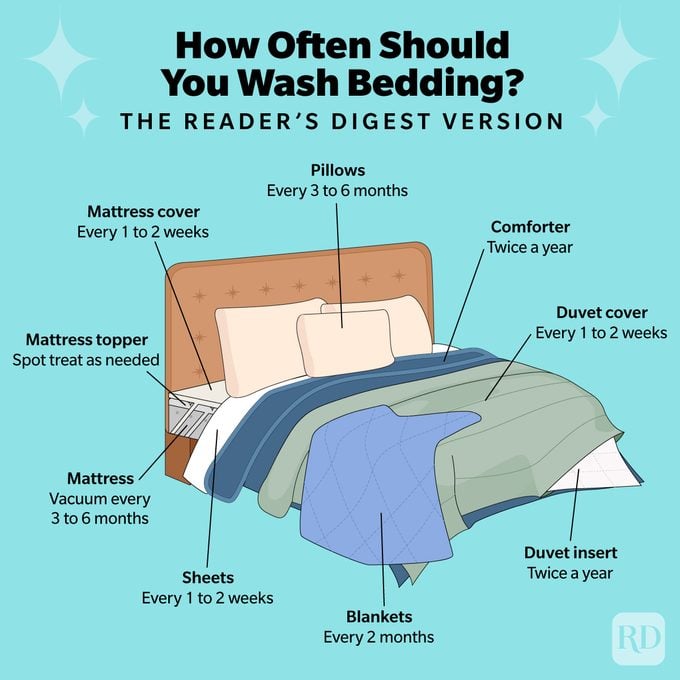Imagine sliding into bed at the end of a long day, enveloped in the comforting embrace of freshly washed sheets. It’s a simple pleasure that can transform your sleep experience.
But how often should you wash your sheets to maintain that blissful feeling? You might be surprised by the answer. Your bed is more than just a resting place; it’s a sanctuary where you spend a significant portion of your life.
However, without regular cleaning, it can become a breeding ground for dust mites, bacteria, and allergens, all of which can disrupt your sleep and affect your health. Are you unknowingly sharing your bed with unwanted guests? Dive into the details and discover the secrets to a cleaner, healthier sleep environment. Uncover the science behind sheet cleanliness and learn how you can enhance your well-being with just a few simple changes to your routine. Keep reading to find out how often you should really wash your sheets—and why it matters more than you think.
Importance Of Clean Sheets
Clean sheets are vital for your health and well-being. They provide comfort and freshness in your sleeping environment. Dirty sheets can harbor dust, allergens, and bacteria. These can affect your sleep quality and overall health. Keeping your bed clean is crucial for restful nights.
Importance Of Hygiene
Maintaining hygiene with clean sheets is essential. Sheets collect sweat, body oils, and dirt. These elements create a breeding ground for bacteria. Regular washing reduces these risks. Clean sheets help prevent skin irritations and allergies. They also reduce the risk of infections.
Enhancing Sleep Quality
Fresh sheets contribute to a better sleep experience. The feel of clean fabric can improve comfort. This can lead to deeper and more restful sleep. Sleep quality affects mood and productivity. Clean sheets can play a role in enhancing these.
Prolonging Sheet Life
Washing sheets regularly can prolong their lifespan. Dirt and oils can weaken fabric fibers over time. Clean sheets remain soft and durable longer. Proper care extends the usability of your bedding. This can save money and maintain comfort.
Impact On Indoor Air Quality
Dust and allergens in sheets affect air quality. Regular washing helps minimize these particles. Clean sheets contribute to a healthier indoor environment. This can benefit those with respiratory issues. Good air quality is crucial for overall health.
Factors Affecting Washing Frequency
Washing your sheets regularly is essential for maintaining a healthy sleep environment. Various factors influence how often you should change your bedding. Understanding these can help you decide the best schedule for washing your sheets.
Personal Hygiene
Your personal hygiene habits significantly impact sheet washing frequency. If you shower before bed, your sheets stay cleaner longer. People who sweat excessively at night might need to wash their sheets more often. Sweat and body oils can accumulate, making the sheets less fresh.
Allergies And Health Conditions
Allergies can worsen with unwashed sheets. Dust mites and pollen can gather, triggering symptoms. Those with asthma or sensitive skin should wash sheets weekly. Clean sheets help reduce allergens, promoting better health.
Climate And Weather
Climate plays a role in how quickly your sheets get dirty. Hot and humid weather can increase sweating. This may require more frequent washing. During cooler months, sheets may stay fresh longer. Adjust your washing schedule to match seasonal changes.
Pet Owners And Children
Pets and kids add extra considerations for sheet washing. Pets often bring dirt and dander onto beds. Children can have accidents or spills, needing immediate cleaning. In such cases, washing sheets weekly or more often is advisable.
Recommended Washing Schedule
Keeping your sheets clean ensures a healthy sleeping environment. The frequency of washing sheets can vary based on personal habits and preferences. Understanding the recommended washing schedule can help maintain hygiene and comfort. Let’s explore how often you should wash your sheets.
Weekly Washing
Washing sheets weekly is a popular choice for many. It helps remove sweat, oils, and allergens. Regular washing keeps sheets fresh and comfortable. This schedule is ideal for those with allergies or sensitive skin.
Bi-weekly Washing
Bi-weekly washing works for those with less sensitive skin. It suits people who sleep in clean nightwear. This schedule can fit well with a busy lifestyle. Ensure you are still maintaining other bedroom hygiene practices.
Special Circumstances
Sometimes, sheets need more frequent washing. Pets sleeping in the bed require more frequent cleaning. Hot weather can also increase sweating, necessitating more washes. If someone is ill, wash sheets more often to prevent germ spread.

Credit: www.rd.com
Best Practices For Washing Sheets
Keeping your sheets clean is crucial for good hygiene and better sleep. Knowing the best practices ensures your sheets stay fresh and last longer. Follow these simple guidelines to maintain the quality and comfort of your bedding.
Choosing The Right Detergent
Pick a detergent suited for your fabric type. Gentle detergents are best for delicate materials like silk or linen. For cotton sheets, use a regular detergent. Avoid harsh chemicals that can damage fibers and irritate skin.
Optimal Water Temperature
Hot water kills most bacteria and dust mites. Use warm water for colored sheets to prevent fading. Cold water is best for delicate fabrics to avoid shrinking. Always check the label for temperature recommendations.
Drying Techniques
Air drying is gentle and prevents shrinking. Use a dryer on a low setting for faster drying. Avoid direct sunlight for colored sheets to prevent fading. Shake out sheets before drying to reduce wrinkles.
Signs It’s Time To Wash
Keeping your sheets clean is important for your health and comfort. Knowing when to wash them can be tricky. There are clear signs that tell you it’s time for a wash. These signs show up in your everyday life. They affect how you feel and sleep. Let’s dive into these signs and see what they mean for your sheets.
Visible Stains And Odors
Stains on your sheets are a clear sign. They can come from sweat, spills, or dirt. These marks are not just unsightly. They can also harbor bacteria. Odors are another strong indicator. A stale smell means it’s time for a wash. Fresh sheets not only look better. They smell better too.
Increased Allergic Reactions
Allergy symptoms can flare up with dirty sheets. Dust mites love unwashed bedding. They can cause sneezing and runny noses. If you wake up with itchy eyes, it might be your sheets. Washing them regularly can reduce allergens. Fresh sheets mean fewer allergic reactions.
Feeling Uncomfortable
Comfort is key for a good night’s sleep. Dirty sheets can make you feel itchy or irritable. A rough texture can disturb your sleep. Clean sheets feel soft and inviting. They help you relax at night. If your bed feels uncomfortable, it’s a sign. Time to wash those sheets.

Credit: www.sleepadvisor.org
Tips For Maintaining Freshness
Maintaining the freshness of your sheets requires a few simple tricks. These steps not only ensure cleanliness but also prolong the life of your bedding. By adopting smart habits, you can enjoy a comfortable and hygienic sleep environment. Let’s explore some practical tips to keep your sheets fresh and inviting.
Using Mattress Protectors
Mattress protectors are effective barriers against dirt and moisture. They shield your mattress from spills and dust mites, keeping it clean. Choose a breathable protector to enhance comfort and airflow. Wash the protector regularly to maintain its effectiveness. This keeps your sleeping area fresh and hygienic.
Regular Pillowcase Changes
Pillowcases collect oils, sweat, and dirt over time. Change them more often than sheets to maintain cleanliness. Aim to swap pillowcases every few days. This simple habit reduces allergens and skin irritation. Your face will thank you for the freshness.
Daily Habits To Reduce Dirt
Daily habits play a big role in keeping your sheets clean. Shower before bed to remove dirt and sweat. Avoid eating in bed to prevent crumbs and spills. Keep pets off the bed to minimize hair and dander. These practices ensure a cleaner, fresher sleeping space.

Credit: www.facebook.com
Frequently Asked Questions
How Often Should You Wash Bed Sheets?
It’s recommended to wash bed sheets every one to two weeks. Regular washing helps remove allergens, sweat, and bacteria. If you have allergies or sensitive skin, consider washing them more frequently. This ensures a clean, healthy sleeping environment and prolongs the life of your sheets.
Can Unwashed Sheets Affect Your Health?
Yes, unwashed sheets can harbor dust mites, bacteria, and allergens. These can lead to skin irritations and allergies. Regularly washing your sheets reduces these risks and promotes better health. Clean sheets also improve sleep quality, making your bed a more comfortable and inviting place to rest.
What Is The Best Way To Wash Sheets?
Use warm water and a gentle detergent to wash sheets. Avoid using too much detergent as it can build up. Dry sheets on a medium setting to prevent shrinkage. For added freshness, consider adding a few drops of essential oil during the rinse cycle.
Is It Necessary To Wash Sheets After Being Sick?
Yes, it’s important to wash sheets after an illness. This helps remove germs and prevents re-infection. Use hot water and a disinfectant laundry additive if possible. Clean sheets contribute to a healthier recovery environment and help maintain overall hygiene in your bedroom.
Conclusion
Regularly washing your sheets ensures better sleep and health. Clean sheets reduce allergens and bacteria. Aim to wash them every one to two weeks. This keeps your bed fresh and inviting. For those with allergies, weekly washing is best. Use gentle detergent for sensitive skin.
Always dry sheets completely to prevent mold. Fresh sheets can improve your sleep quality. Keep your bedding clean for a healthier lifestyle. Consistent washing makes your bed a cozy retreat. Remember, a clean bed is a happy bed. Stay comfortable and rest well with clean sheets.
